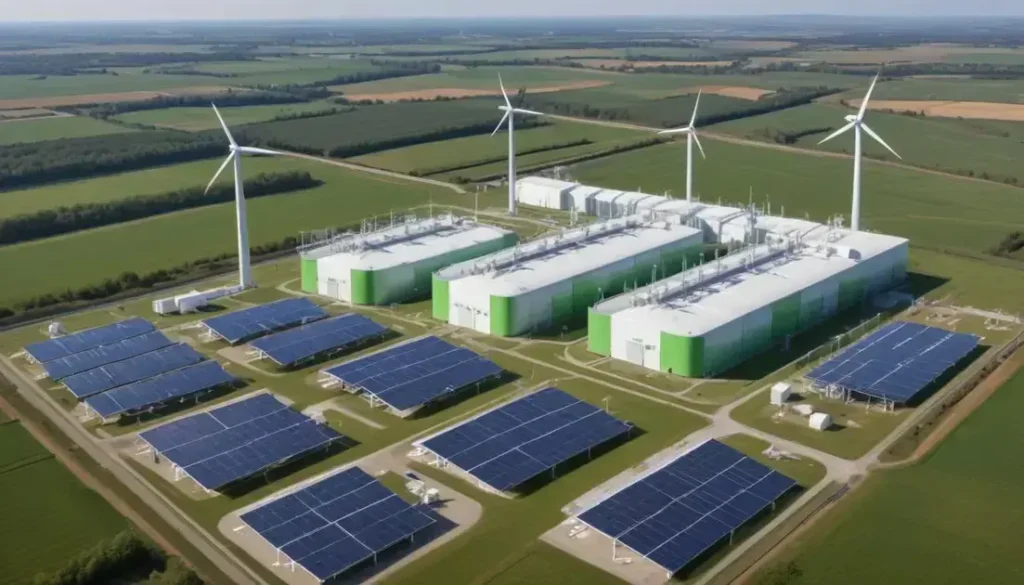AI adoption in businesses enhances efficiency by automating tasks, providing data-driven insights, and optimizing operations, making it essential for competitiveness and innovation in today’s market.
AI is revolutionizing the way we approach energy efficiency. In this article, we’ll delve into how AI can empower businesses to achieve sustainable practices, especially in the energy sector.
Introduction to AI and its potential
The advancement of Artificial Intelligence (AI) is reshaping numerous industries, unleashing transformational solutions and streamlining processes. Embracing this technology allows for the automation of repetitive tasks, leading to increased productivity and reduced errors. Moreover, AI enhances customer service personalization, offering more engaging and effective experiences.
Benefits and Applications of AI: AI not only optimizes operations but also aids in strategic decision-making through predictive data analysis. This approach is vital in sectors such as healthcare, finance, and digital marketing. By integrating AI with Big Data, organizations can vastly improve their ability to generate valuable insights, guiding targeted campaigns and customized strategies.
When implementing AI, it’s crucial to focus on data security and algorithm transparency. Companies that prioritize these aspects build trusting relationships with their clients, standing out in a competitive market. To successfully adopt AI, starting with pilot projects is recommended, allowing businesses to assess impact and refine strategies as needed.
Impact of AI on energy sustainability
The impact of AI on energy sustainability is profound, with technology offering innovative solutions to age-old challenges. AI enables the optimization of energy consumption, helping businesses reduce waste and operate more efficiently. By analyzing vast amounts of data, AI identifies patterns that conventional methods might overlook, thereby enhancing energy efficiency.
One significant application of AI in this field is in smart grids. These grids utilize AI algorithms to distribute energy based on real-time demand, balancing load and reducing the likelihood of outages. Furthermore, AI can predict energy consumption trends, allowing companies to prepare and adjust their supply chains accordingly.
Energy management systems powered by AI also facilitate the integration of renewable energy sources. These systems assess both current and forecasted renewable outputs, ensuring that supply matches demand. Consequently, this assists in stabilizing the grid and promotes the use of cleaner energy alternatives.
Moreover, companies employing AI-driven tools are better equipped to meet regulatory requirements aiming for carbon reduction. This capability not only aligns with global sustainability goals but also enhances their market competitiveness and reputation within their respective industries.
Philippe Rambach’s insights on AI
Philippe Rambach offers crucial insights into the role of Artificial Intelligence (AI) in modern industries, emphasizing its transformative potential. According to Rambach, AI stands at the forefront of innovation, driving efficiencies and enhancing decision-making across sectors. He highlights how AI technologies simplify complex processes, allowing companies to be more agile and responsive to market demands.
Rambach points out that the true power of AI lies in its ability to analyze huge datasets quickly, identifying actionable trends that human analysts might miss. This capability enables businesses to make informed decisions, positioning them ahead of competitors. He believes that organizations investing in AI will not only improve operational efficiency but also foster a culture of continuous improvement.
Furthermore, Rambach stresses the importance of integrating AI with a company’s existing systems. He asserts that successful implementation requires collaboration between technology and human intelligence. Training employees to work alongside AI tools strengthens overall workforce capabilities and enhances innovation.
Through his insights, Rambach encourages businesses to embrace AI as a tool for sustainable growth. By prioritizing intelligent technology, companies can unlock new opportunities, reduce costs, and improve customer satisfaction, ensuring a competitive edge in their respective markets.
Decarbonization through AI
Decarbonization through AI represents a groundbreaking approach to addressing climate change. AI technologies enable industries to analyze energy consumption patterns, identifying opportunities for reducing carbon footprints. By leveraging data, businesses can make informed decisions that lead to substantial emissions reductions.
One way AI contributes to decarbonization is through predictive analytics. These tools forecast energy needs, allowing for more efficient resource allocation. For instance, AI can optimize the operations of renewable energy sources like solar and wind, adjusting production based on forecasted demand. This adaptability reduces reliance on fossil fuels and drives a shift towards sustainable energy solutions.
Moreover, AI facilitates smart buildings that enhance energy efficiency. By integrating AI systems, buildings can monitor energy usage in real-time, automatically adjusting temperatures and lighting to optimize consumption. This not only lowers emissions but also translates into cost savings for businesses.
Additionally, AI supports the development of carbon capture technologies. By analyzing emissions data and optimizing capture processes, companies can effectively mitigate their environmental impact. Thus, embracing AI in decarbonization efforts is pivotal for organizations aiming to align with global sustainability targets and enhance their reputation as responsible corporate citizens.
Role of AI in optimizing energy use
The role of AI in optimizing energy use is pivotal in today’s quest for sustainability. AI technologies analyze energy consumption patterns, helping businesses identify inefficiencies and implement strategies for reduction. By utilizing machine learning algorithms, companies can forecast energy needs with remarkable accuracy, thus minimizing waste.
One of the key applications of AI is in demand response systems. These systems automatically adjust energy usage based on real-time data, ensuring that electricity is used efficiently during peak and off-peak times. For instance, AI algorithms can control HVAC systems in large buildings, optimizing energy usage while maintaining comfort levels.
Additionally, AI supports the integration of renewable energy sources into the grid. By predicting energy generation from sources like solar and wind, AI facilitates better planning and resource allocation. This leads to a more stable energy supply and reduces reliance on fossil fuels.
Moreover, AI-powered platforms continuously learn from data inputs, allowing for ongoing optimization of energy systems. This adaptability means businesses can refine their energy strategies over time, ultimately leading to lower operational costs and reduced carbon emissions. Overall, AI plays an essential role not just in enhancing efficiency but also in paving the way towards a greener future.
Trends in AI for energy efficiency
Current trends in AI for energy efficiency reveal a significant shift towards smarter, more integrated energy systems. As organizations become more aware of their environmental impact, AI technologies are increasingly adopted to optimize energy consumption and reduce costs. One notable trend involves the use of machine learning algorithms that analyze consumption patterns to identify inefficiencies.
Another prominent trend is the development of AI-driven predictive maintenance. By monitoring equipment in real-time, AI can predict when maintenance is needed, thereby preventing costly breakdowns and energy wastage. This proactive approach not only extends the lifespan of machinery but also enhances overall efficiency.
Additionally, the integration of AI with Internet of Things (IoT) devices is becoming more common. Smart sensors collect data in real-time, which AI algorithms then analyze to optimize energy usage. This synergy allows businesses to adjust their energy consumption based on real-time conditions, ensuring peak efficiency.
Furthermore, AI is transforming the way renewable energy sources are utilized. Advanced algorithms assess weather patterns and predict energy generation from solar and wind sources, enabling better grid management. Overall, these trends signal a promising future where AI not only enhances energy efficiency but also plays a critical role in supporting global sustainability efforts.
Adoption strategies for Indian businesses
Adoption strategies for Indian businesses aiming to integrate AI into their operations are crucial for staying competitive. First and foremost, companies should undertake a thorough assessment of their current technological capabilities. Understanding existing infrastructure allows for a tailored approach to AI implementation that maximizes resources and minimizes disruptions.
Furthermore, training employees is essential to ensure a smooth transition. Implementing training programs helps staff become proficient with new AI technologies. This knowledge builds trust and encourages innovation among team members, making them more receptive to change.
In addition, businesses should consider starting with pilot projects. These smaller-scale initiatives allow organizations to test AI technologies without significant risk. By measuring outcomes and adjusting strategies based on pilot results, companies can refine their approaches before a full-scale rollout.
It is also important for businesses to foster collaboration within the organization. Encouraging cross-departmental teams to work together on AI initiatives promotes knowledge sharing and collective problem-solving. Finally, Indian businesses should stay informed about the latest trends and best practices in AI adoption. This ongoing education enables companies to remain agile and adapt to changes in technology and market demands accordingly.
Challenges in AI implementation
The implementation of AI in businesses often faces several challenges that can hinder success. One significant obstacle is the lack of skilled personnel. Companies frequently struggle to find qualified professionals who can develop and maintain AI systems. This skills gap can delay projects and lead to inadequate implementation.
Data quality and availability pose another challenge. AI systems rely heavily on large datasets to learn and make decisions. If the data is incomplete, outdated, or biased, the AI will produce unreliable results. Therefore, organizations must prioritize data management and invest in high-quality data acquisition.
Additionally, resistance to change is common within organizations. Employees may fear job losses or feel uncomfortable with new technologies. To overcome this challenge, it is crucial for leadership to promote a culture of innovation and offer training programs that demonstrate how AI can complement human efforts rather than replace them.
Moreover, ethical considerations regarding AI usage are increasingly prominent. Concerns about privacy, security, and algorithmic bias require companies to develop robust governance frameworks. Addressing these ethical concerns ensures that AI implementation aligns with societal values and builds trust with customers.
Conclusions and future outlook
The future outlook for AI technology in various industries appears promising, particularly in enhancing efficiency and sustainability. As companies continue to embrace artificial intelligence, they are likely to see significant improvements in operational processes, leading to cost reductions and increased productivity. The ongoing advancements in machine learning and data analytics will further propel AI’s capabilities, providing businesses with deeper insights into customer behaviour and market trends.
Moreover, the integration of AI with emerging technologies, such as the Internet of Things (IoT) and blockchain, is expected to drive innovative solutions across sectors. This synergy will enhance decision-making processes and foster greater transparency in operations. As AI systems become more sophisticated, their applications will expand, enabling companies to tackle complex challenges more effectively.
However, businesses must also navigate ethical considerations surrounding AI deployment. Addressing concerns related to privacy, security, and algorithmic bias will be crucial in maintaining consumer trust and ensuring compliance with regulatory frameworks. Companies that prioritize ethical AI practices will likely gain a competitive edge in the market.
In conclusion, as AI continues to evolve, organizations must remain agile, adapting to technological advancements while ensuring responsible usage. The commitment to ethical and sustainable AI practices will define the industry’s future and shape a more efficient and equitable world.
In Conclusion: Embracing the Future with AI
Adopting Artificial Intelligence (AI) can transform businesses in various sectors. It helps streamlining operations, enhancing decision-making, and improving customer experiences.
As organizations move forward, they should focus on integrating AI thoughtfully. Starting with pilot projects can help identify the best applications for their specific needs while ensuring smooth implementation.
Moreover, addressing ethical concerns surrounding AI use is essential. By prioritizing transparency and fairness, companies can build consumer trust and secure their position in the market.
Overall, AI presents a unique opportunity for businesses to innovate and grow. With thoughtful implementation, companies can unlock new potentials and navigate the future successfully.
Frequently Asked Questions
How can AI improve operational efficiency in my business?
AI can automate repetitive tasks, enhance decision-making, and provide data-driven insights, leading to improved efficiency and productivity.
What are the initial steps for implementing AI?
Start by assessing your current processes, identifying areas that can benefit from AI, and conducting pilot projects to evaluate effectiveness.
What challenges might I face when adopting AI?
Common challenges include a lack of skilled personnel, data quality issues, and resistance to change within the organization.
How can I ensure the ethical use of AI in my business?
Develop clear guidelines that prioritize transparency, data privacy, and fairness to prevent bias and build consumer trust.
What role does employee training play in AI implementation?
Training employees is crucial to ensure they understand and effectively use AI technologies, promoting a culture of innovation.
Can small businesses leverage AI effectively?
Yes, small businesses can adopt scalable AI solutions that fit their needs, allowing them to compete and innovate in the market.


